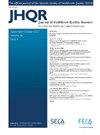Experiencias, percepciones y emociones de los pacientes crónicos hospitalizados tras un programa de intervencion musical
IF 1
Q4 HEALTH CARE SCIENCES & SERVICES
引用次数: 0
Abstract
Aim
Musical interventions for hospitalized patients have shown benefits such as improved mood and reduced stress, but their impact from a qualitative perspective is under-explored. This study aimed to understand the experiences, perceptions, and emotions of chronically ill hospitalized patients who participated in a program of individual micro-concerts during their hospital stay.
Methodology
A qualitative study was conducted in a hospital in Bilbao, Spain, in 2024. Hospitalized patients were offered 20-minute micro-concerts three times a week. Semi-structured interviews were conducted with 21 patients selected through purposive sampling. The interviews were transcribed and analyzed inductively to identify thematic patterns.
Results
The analysis identified four categories. The first was emotional and cognitive well-being, where patients reported improvements in mood and cognitive stimulation. The second category, the operational aspects of the intervention, highlighted the positive perception of the frequency, duration, and personalization of the sessions. The third category was personal evaluation, where the role of the music therapist was highlighted as a key factor in the success of the intervention. Finally, suggestions for improvement included recommendations to extend the program to other areas of the hospital and combine musical interventions with complementary activities.
Conclusions
Personalized musical interventions have a positive impact on the emotional and cognitive well-being of patients. It is essential to design flexible interventions that adapt to individual needs and promote integrated care models.
音乐干预方案后住院的慢性病患者的经历、感受和情绪
AimMusical对住院患者的干预已经显示出改善情绪和减轻压力等益处,但从定性角度来看,它们的影响尚未得到充分探讨。本研究旨在了解慢性疾病住院患者在住院期间参加个人微音乐会的体验、感知和情绪。方法于2024年在西班牙毕尔巴鄂的一家医院进行定性研究。住院患者每周有三次20分钟的微音乐会。采用目的抽样法对21例患者进行半结构化访谈。对访谈进行转录和归纳分析,以确定主题模式。结果分析确定了四类。第一个是情绪和认知健康,患者报告情绪和认知刺激有所改善。第二类,即干预的操作方面,强调了对会议频率、持续时间和个性化的积极看法。第三类是个人评估,其中音乐治疗师的作用被强调为干预成功的关键因素。最后,改进建议包括将该项目扩展到医院的其他领域,并将音乐干预与补充活动结合起来。结论个性化音乐干预对患者的情绪和认知健康有积极影响。必须设计适应个人需要的灵活干预措施,并促进综合护理模式。
本文章由计算机程序翻译,如有差异,请以英文原文为准。
求助全文
约1分钟内获得全文
求助全文
来源期刊

Journal of Healthcare Quality Research
Medicine-Health Policy
CiteScore
1.70
自引率
8.30%
发文量
83
审稿时长
57 days
期刊介绍:
Revista de Calidad Asistencial (Quality Healthcare) (RCA) is the official Journal of the Spanish Society of Quality Healthcare (Sociedad Española de Calidad Asistencial) (SECA) and is a tool for the dissemination of knowledge and reflection for the quality management of health services in Primary Care, as well as in Hospitals. It publishes articles associated with any aspect of research in the field of public health and health administration, including health education, epidemiology, medical statistics, health information, health economics, quality management, and health policies. The Journal publishes 6 issues, exclusively in electronic format. The Journal publishes, in Spanish, Original works, Special and Review Articles, as well as other sections. Articles are subjected to a rigorous, double blind, review process (peer review)
 求助内容:
求助内容: 应助结果提醒方式:
应助结果提醒方式:


